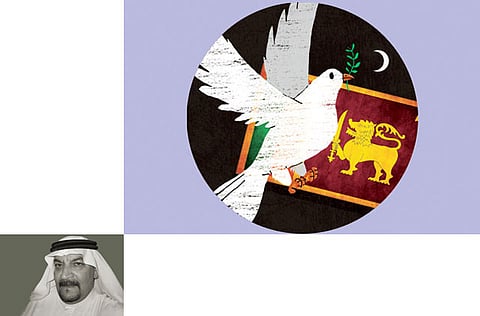Sri Lanka's road to peaceful co-existence
The intent to demolish Dambulla mosque tears at wounds of ethnic violence which are in the process of healing

Following a protracted and violent civil war that lasted for more than 26 years costing thousands of lives and destruction of property, it would have been natural to assume that Sri Lanka would set itself on the path of healing through national reconciliation with all its peoples; Buddhists, Tamils and Muslims.
Yet, within many Tamils there exists a widespread belief that the Sri Lankan government is trying to wipe out their Tamil culture and religious identity by constructing Buddhist temples in Tamil areas. Now many of another ethnic minority feel recent moves have taken another dimension.
In a dangerous precedent reminiscent of another time and place, the Sri Lankan Prime Minister D.M. Dayaratne ordered the demolition of a 65-year-old mosque in Dambulla stating that the area was sacred to Buddhists. He tried to appease local sentiments by saying that the mosque would be relocated to another area. This public statement followed events recently when Buddhist agitators stormed the mosque and vandalised it, threatening its destruction.
The incident undoubtedly angered the island's Muslim community who have seen enough suffering and were severely victimised during the civil war for which they had paid a heavy price. During the civil war, caught in the crossfire between the government and the Tamils, they were attacked and slaughtered in village after village, even while offering prayers in the sanctity of their mosques. Their paddy lands were looted, businesses closed and had their very means of survival taken away. The entire Jaffna Muslim population was booted out of their homes and their belongings and property were stolen from them.
They are shocked and hurt that the demolition order strikes at the very core of religious freedom in a country attempting to heal itself. Muslim Congress Secretary and parliamentarian Hassan Ali said the "community will not accept a mosque in another place even if it was built of gold".
He also added that "If the places of religious worship of the minorities are being attacked while the police and army are idly watching, it implies that they are supporting the marauders and providing security to them, instead of the law abiding people". Faced with the initial opposition, the prime minister claimed that this decision was taken after consultations with Muslim politicians. However, it was immediately debunked as a ‘blatant manufactured lie' and strongly rejected by leading Muslim politicians: Senior Minister A.H.M. Fawzie, Deputy Minister M.L.A.M. Hizbulla, Western Province Governor Alavi Moulana and Parliamentarian Abdul Khader, all of whom categorically reject the prime minister's claims. They assert that the mosque was built on land legally bought in 1964 and simply dismiss the allegations of militant Buddhists who claimed this area was sacred just two years ago.
Misleading people
Asad Sally, chairman of the Islamic Solidarity Front (ISF) and former deputy mayor of Colombo, stated that "it is misleading to say that the mosque was in existence for two years as it has been there for more than 65 years. We have all the documents to prove that it is a legally constructed mosque under the Waqf Act. Therefore the statement by the prime minister claiming that the unauthorised construction of the mosque has been stopped is totally false. The land on which the mosque was located was bought by a Muslim lady in Jaffna from Englishmen. This mosque has existed since then.
"Later the adjacent land too had been bought by mosque authorities in 1995. This statement by the prime minister is misleading the Buddhists in the country. The prime minister should not make such irresponsible statements as the Waqf Board comes under him and he is contradicting his own statement. Besides statements like Muslims will not have a place to urinate are not only irresponsible but very dangerous too."
Though the leader of the United National Party Ranil Wickremasinghe is yet to make a public statement on the tense situation, his deputy Sajith Premadasa described the prime minister's order as "law of the jungle and nothing to do with Buddhism". Sajith wondered "how could we develop the country when the prime minister's office issues such false statements?"
Some public figures deplored the political pandering of the prime minister to a few Buddhist thugs, stating that in any civilised society one would expect unruly elements who vandalise places of worship to be arrested and brought to justice. Instead they have been rewarded in violation of all principles of human decency.
Following Sri Lanka's recent and turbulent past, Tamils, Muslims and others had been looking forward to a period of peace and harmony. However the intent to demolish the Dambulla mosque tears at the wounds of ethnic violence still in the process of healing, and only serves to prove that reconciliation, peace and progress are nothing but distant dreams. The historical co-existence of Tamils and Muslims among the Buddhist Sinhalese people for more than 1,000 years is under threat.
Tariq A. Al Maeena is a Saudi socio-political commentator. He lives in Jeddah, Saudi Arabia.
Sign up for the Daily Briefing
Get the latest news and updates straight to your inbox



